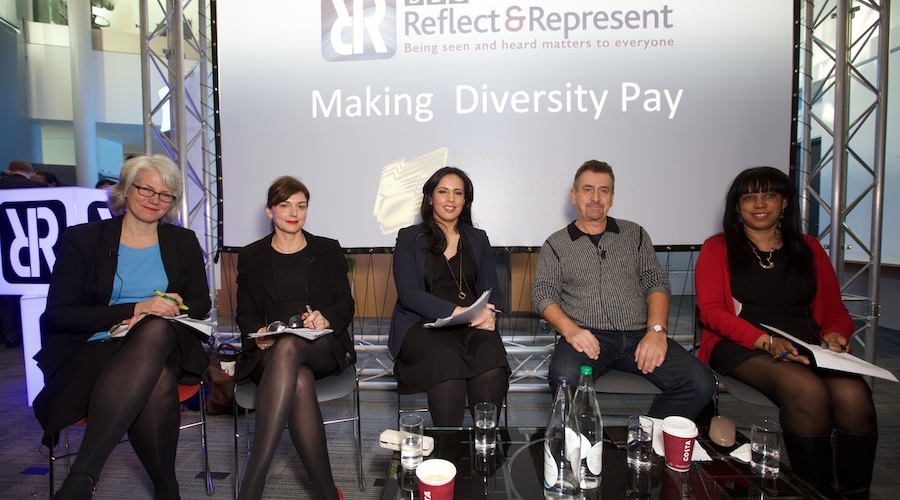A joint RTS/BBC session looking at economic arguments for diversity heard that while broadcasters are making greater efforts to improve black and minority ethnic representation on- and off-screen but much work remains to be done.

A joint RTS/BBC session examining the economic arguments for diversity heard that while broadcasters are making greater efforts to improve black and minority ethnic representation on- and off-screen, much work remains to be done.
The BBC, in particular, received stinging criticism from panelists and audience members. “Sky, Channel 4, and ITV are moving in the right direction. The BBC is still introducing training and mentoring schemes that they did 30 years ago, that they do every 10 years and that still haven’t worked,” said TV veteran Charlie Hanson.
“Perhaps [it’s] because the BBC doesn’t have the commercial imperative [to make programmes for BAME people] that they’re lagging behind,” he added.
As the producer of C4 sitcoms No Problem! and Desmond’s in the 1980s and 1990s, Hanson said he “owed his career to diversity”. A few year later he devised the sketch show, The Real McCoy, for the BBC, which featured black and Asian comics. “They were doing it out of embarrassment – they’d been left behind,” he said. “The BBC has never really seen their debt to people paying the licence fee as something they had to take seriously – perhaps now they are.”
The New Broadcasting House event, “Making Diversity Pay”, chaired by BBC Radio 4 Saturday Live presenter Aasmah Mir, was part of the BBC’s “Reflect and Represent Week”. This included a session on BBC Two transgender sitcom Boy Meets Girl and an interview with Sally Wainwright, the creator of Last Tango in Halifax and Happy Valley.
Diane Kemp, Professor of Broadcast Journalism at Birmingham City University, argued that the economic case for diversity was proven. Turning the question on its head, she asked: “What is the cost if you don’t have diversity at the heart of what you do?”

Without diversity, Kemp said, “you’re going to lose stories; in terms of news, you’re going to lose experts and fresh angles on life; and particularly for public service broadcasting where you have a licence fee that everybody pays, you’re going to lose that legitimacy unless people can see themselves, their lives and their point of view reflected”.
Hanson now runs Tantrum Films with the director, Amma Asante, who recently enjoyed critical and commercial success with the Belle, a film based on the life of an 18th century woman of mixed race.
“[Amma] along with a lot of her contemporaries are working in America, mostly because they never get asked to do anything in this country. We have a talent drain as a result of the lack of investment in diverse voices, whether that be writers, directors or producers,” Hanson claimed.
Former EastEnders and Holby City series producer Barbara Emile, who is an executive producer at new Lenny Henry indie Douglas Road Productions, said “there is amazing [diverse] talent in this country, across the board”.
Emile backed ring-fencing money “as the fastest, most efficient way” to boost diversity in front of and behind the camera, and to ensure change is lasting.
Former RTS Chief Executive Simon Albury, who chairs the Campaign for Broadcasting Equality, said the BBC has a “miniscule, derisory ring-fenced fund” for on-screen representation.”

Albury argued for the adoption of the “Lenny Henry plan to drive off-screen employment where the power lies. The editorial decision-making is off-screen.” This plan would see funds ring-fenced to increase BAME representation in the same way that budgets are reserved for regional programmes.
Last August, Sky set a target that 20% of the stars and writers of its homegrown UK output would come from a BAME background by the end of 2015. This surpasses the BBC’s target of 15% representation over three years, which is limited to on-screen talent
Jane Millichip, Managing Director of Sky Vision, said that the impact of the 20% quota in her international sales division would be “positive because [it would give] a better, more natural representation on screen in drama of the world we live in”.
She added: “Proper diversity on screen is good for international sales, putting it crudely, in business terms.”
“In international, the diversity of programming tends to fall into two camps: those shows where the diversity is incidental and those where the story is the diversity itself. Both can sell well – it just depends how the story is told,” Millichip added.
Emile argued that emerging markets around the world and the growth of online programming offered huge opportunities to British telly. “If we limit ourselves and do not consider diversity, as producers we are at a disadvantage. We’ve got to get real if we’re going to sell programmes.”
https://www.facebook.com/media/set/?set=a.1598654003680857.1073741835.15...

